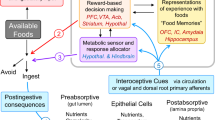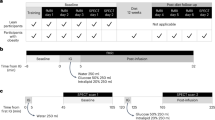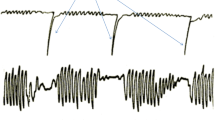Abstract
IT is usually assumed that absorbed nutrients have effects which contribute to the control of food intake. Indeed, we have suggested that the rate of flow of energy to working tissues is the basic controlling factor in appetite and satiety1,2. The chief absorbed energy substrate in the rat on a laboratory diet is glucose: yet glucose administration does not always produce a decrease in energy intake which compensates for all the glucose energy administered. Such negative findings may be artefacts of failure to mimic the absorption of glucose during normal satiety; sometimes, for instance, as has been pointed out3,4, undetectably low doses, unphysiological concentrations and volumes, and starved rats that are not easily satiated have been used. Furthermore, it may be necessary to produce the normal context for nutrient utilisation, such as adequate secretion of insulin. For example, the reduction in food intake during continuous intravenous infusion of glucose is at most 0.6 kcal per kcal infused: coinfusion of insulin corrects this incomplete compensation5. We report here that the context of the initial absorption of a meal on familiar diet permits full compensation for infused glucose by a decrease in meal size. In contrast, when an unfamiliar cue is added to the diet, conditioning of appetite6,7 by the infusion is sufficient to overwhelm satiety, disrupting compensation and causing faster weight gain.
This is a preview of subscription content, access via your institution
Access options
Subscribe to this journal
Receive 51 print issues and online access
$199.00 per year
only $3.90 per issue
Buy this article
- Purchase on Springer Link
- Instant access to full article PDF
Prices may be subject to local taxes which are calculated during checkout
Similar content being viewed by others
References
Booth, D. A. Physiol. Behav. 9, 199–202 (1972).
Nicolaïdis, S. Proc. XXVI Int. Congr. Physiol. Sci. New Delhi, 10 (1974).
Booth, D. A. J. comp. Physiol. Psychol. 78, 412–432 (1972).
Booth, D. A. & Jarman, S. P. J. Physiol., Lond. 259, 501–522 (1976).
Nicolaïdis, S. & Rowland, N. Am. J. Physiol. 231, 661–668 (1976).
Booth, D. A. J. comp. Physiol. Psychol. 81, 457–571 (1972).
Booth, D. A. in Food Intake and Chemical Senses (eds Katsuki, Y. et al.) (University Park Press, Baltimore, 1977).
Nicolaïdis, S., Rowland, N., Meile, M-J., Marfaing-Jallat, P. & Pesez, A. Pharmac. Biochem. Behav. 2, 131–136 (1974).
Le Magnen, J. C.r. Soc. Biol. 150, 136–139 (1956).
Strubbe, J. H. & Steffens, A. B. Physiol. Behav. 19, 303–308 (1977).
Booth, D. A. in Recent Advances in Obesity Research II (ed Bray, G. A.) (Newman, London, 1978).
Booth, D. A. Psychiat. Clin. N. Am. (in the press).
Author information
Authors and Affiliations
Rights and permissions
About this article
Cite this article
MATHER, P., BOOTH, D. & NICOLAIDIS, S. Compensatory and conditioned feeding responses to scheduled glucose infusions in the rat. Nature 273, 461–463 (1978). https://doi.org/10.1038/273461a0
Received:
Accepted:
Published:
Issue Date:
DOI: https://doi.org/10.1038/273461a0
This article is cited by
-
The effect of manipulating CS hedonic value on the magnitude of a conditioned taste aversion
Current Psychology (1994)
Comments
By submitting a comment you agree to abide by our Terms and Community Guidelines. If you find something abusive or that does not comply with our terms or guidelines please flag it as inappropriate.



